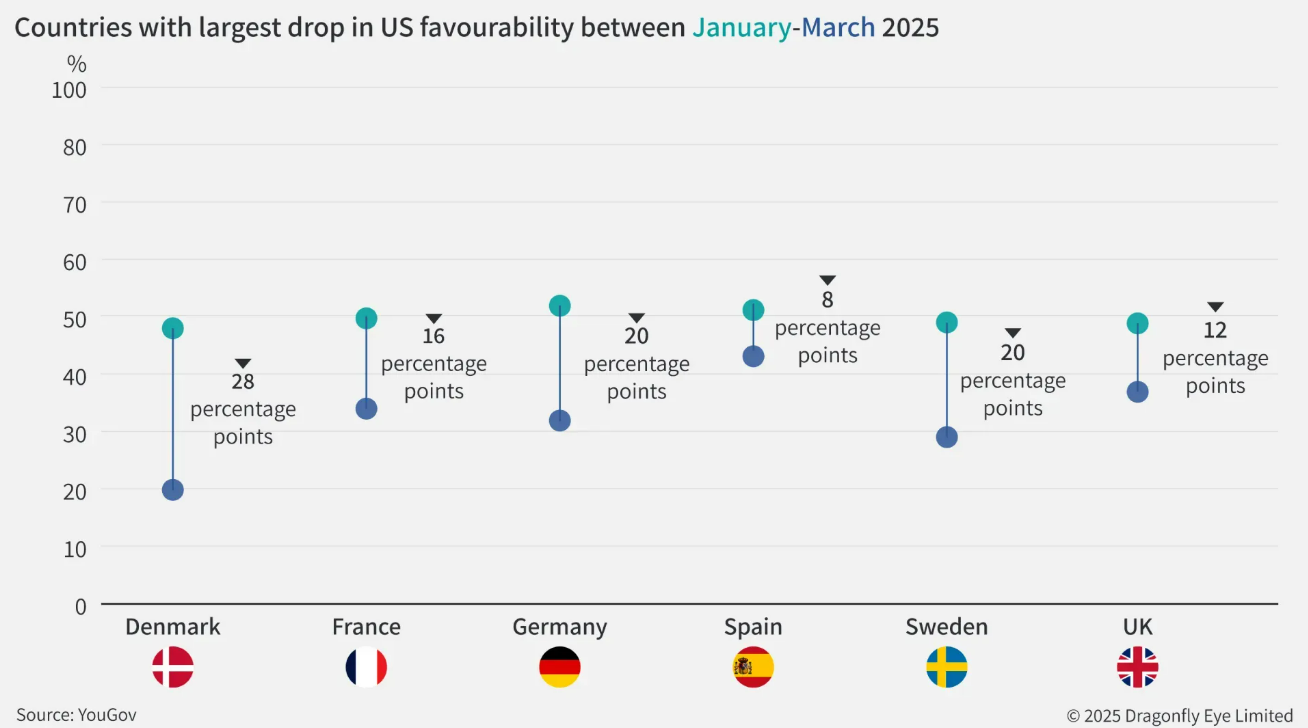In the recent past, business travel carried a sense of routine. It was more about productivity and time zones than geopolitics. But today, the rules have changed — and dramatically so.
Following a long tail of foreign policy disruptions, including escalating trade tensions with China, fractured relationships with long-standing allies, and isolationist rhetoric, outbound US travel safety concerns are on the rise, complicating business travel.
In this article, we explore the new normal of cross-border business travel for American workers – and what businesses need to know to protect their globe-trotting representatives moving forward.
How Business Travel Safety Is Shifting
1. Anti-American Sentiment
While anti-American attitudes have simmered in parts of the world for years, the current administration’s policies—tariffs, travel bans, and diplomatic isolationism—are exacerbating long-standing grievances.
A recent survey issued by Dragonfly shows that US favorability is decreasing dramatically across Europe:
Source: Dragonfly
It’s not just that the rise of anti-American sentiment abroad can increase the chances of confrontation and—to a lesser degree—physical threat for US travelers, as touched upon in a recent article in The Seattle Times. It’s also that travelers are concerned over how they’ll be perceived upon arrival – causing anxiety and hesitation before tickets are even booked.
According to several travel advisors, clients have grown hesitant to travel to certain European and Latin American destinations not because of the destinations themselves — but because of how they might be perceived when they arrive.
Even well-traveled employees who usually jump at an opportunity to fly across borders for a conference meeting may have concerns about their safety that they had never considered before.
It’s unrealistic—and potentially harmful—to expect that all employees feel comfortable traveling as usual in today’s geopolitical climate. Without open dialogue and support, they may feel compelled to prioritize business over their own safety.
As this anxiety grows, so does the responsibility for employers. Under duty of care obligations, organizations are legally and ethically required to protect their employees from foreseeable risk—including psychological stress and the potential for harm while traveling.
When geopolitical tensions, hostile sentiment, or entry delays become credible threats, ignoring those signals doesn’t just endanger individuals—it exposes the entire organization to reputational damage, compliance failures, and liability.
Businesses can’t afford to treat travel hesitations as individual discomfort. They must be acknowledged as emerging indicators of risk that demand a response—through updated policies, specialized training, and a more human-centered approach to travel management.
2. The Rise in Detentions and Border Harassment
It’s not just the leaving that’s giving American business travelers pause — but the returning as well.
Travelers returning to the US are increasingly finding that re-entry is no longer guaranteed to be seamless—or safe. Multiple high-profile incidents have emerged in which US citizens and lawful permanent residents have been detained or questioned for hours by border agents.
Federal officials have insisted such detentions are lawful and routine. But for travelers, that distinction offers little comfort. According to travel advisor Tamara Lidbom, lawful permanent residents are now canceling international trips outright, fearing they’ll be refused re-entry or held up without explanation.
In an interview with the BBC, corporate traveler Mary S.—who withheld her full name over privacy concerns—shared that she had cancelled a planned conference trip to Canada, citing fears of harassment at the border. “There’s no way I’m going anywhere near an airport or border crossing,” she said.
Employees who once traveled confidently across borders are now questioning the personal risks involved, including being targeted for their background, beliefs, or political views.
Without acknowledging these concerns, organizations may find themselves unprepared for a sharp drop in travel readiness among staff — especially among those who feel especially vulnerable to scrutiny. And if travel policies don’t adapt, companies risk failing their duty of care obligations.
3. Air Travel Confidence Is Eroding
Even before takeoff, anxiety is building. Recent staffing shortages and equipment failures at major US airports—especially Newark—have led to a rise in flight disruptions and serious safety concerns. Reports of air traffic control rooms operating at one-quarter staffing levels have prompted warnings from aviation experts and pilots alike.
Though overall aviation fatalities remain low, perception is powerful. Social media discussions about near-misses, technical failures, and flight anxiety have surged on platforms like Reddit and X, according to data from Storyful.
This is particularly alarming for business travelers, who often have rigid schedules and tight itineraries. Travel isn’t just about making the meeting anymore—it’s about whether you can arrive safely and without significant psychological stress.
4. Civil Unrest and Unpredictable Flashpoints
Protests used to be isolated events—now, they’re global, decentralized, and fast-moving. Whether sparked by domestic politics, economic pressures, or international conflict, mass demonstrations can erupt in major cities with little warning.
Business travelers are especially vulnerable. They’re often unfamiliar with local languages and laws, unaware of protest hotspots, and visibly associated with foreign entities. Even peaceful demonstrations can turn quickly, and local transportation, communications, and emergency services are often overwhelmed during these events.
Organizations that don’t prepare their employees for these scenarios are taking a calculated risk—with consequences that can include not just personal harm, but reputational and legal fallout
Are These Concerns Having a Material Impact on Business Travel?
A recent Guild of Business Travel Association (GBTA) survey underscores how dramatically the corporate travel landscape has shifted in just a few months.
While two-thirds of professionals were optimistic about 2025 as recently as November 2024, that number has plunged to 31% amid new tariffs, travel restrictions, and detentions at US borders.
Almost one-third of travel buyers now expect their company’s business travel volume to shrink by an average of 20%. And with nearly half of all respondents citing documentation hurdles and employee reluctance to travel, companies are not only facing logistical roadblocks, but a clear breakdown in employee trust.
Why Current Travel Safety Standards Aren’t Good Enough
Despite mounting American travel safety risks and growing employee hesitation, many organizations are still relying on outdated or overly generic travel safety policies—policies that weren’t designed for today’s level of geopolitical volatility, nor the deeply personal nature of modern travel anxieties.
Most corporate travel protocols still focus on logistics—flight delays, insurance, hotel safety—and overlook the more nuanced threats emerging now:
- Rapid changes in border entry rules
- Psychological stress from scrutiny and perceived targeting
- Shifting political climates that can escalate overnight
- Disparities in how different employees may be treated based on citizenship, race, religion, or background
In this climate, sending employees abroad without robust preparation isn’t just careless—it’s a failure of duty of care. It signals to staff that their safety, confidence, and autonomy are secondary to business objectives.
That’s why organizations must go beyond boilerplate travel handbooks and offer dynamic, human-centered training that empowers employees to recognize, respond to, and recover from risk.
Protect Your People with Travel Safety Training from Cardinus
At Cardinus, we understand that true travel safety begins before the trip—and doesn’t end when employees touch down.
Our Corporate Travel Safety Risk Training is part of a broader, integrated suite of security and safety-focused education that’s designed to transform how employees assess risk and respond under pressure.
Through virtual sessions or in-person workshops, our trainers—many with real-world backgrounds in security, behavioral profiling, and crisis response—help your team build the instinctive awareness and preparedness required in today’s complex global environment.
Our courses include:
- Travel Safety
- Hostile Environment Awareness
- Lone Working
- Conflict Management
- Behavioral Profiling
Every session is tailored to reflect your organization’s specific travel patterns, workforce concerns, and duty of care requirements, ensuring our training gives your traveling employees the clarity and confidence to make smart, safe decisions.
Book now – or Contact Cardinus today to learn more.






